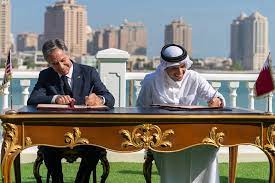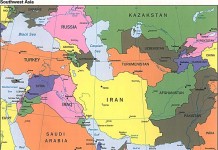 Saudi-Israel Normalization and Beyond
Saudi-Israel Normalization and Beyond
Context
In a previous article we focused on understanding the changing geopolitics of the Middle East. Especially, the political, security, and economic interconnections between South Asia and the Gulf States, and one of the subsets, Pakistan and Gulf Cooperation Council (GCC). This relationship has taken on added significance in the context of ongoing great power rivalry and China’s wider engagement with the Middle East, which resulted in the Saudi-Iran détente in March.
On July 28, 2020, PoliTact held a webinar to discuss the potential China-Iran $400 billion economic deal and its impact on the China-Pakistan Economic Corridor (CPEC). China-Iran defense cooperation has been growing in the aftermath of President Trump’s decision in 2018 to unilaterally withdraw from the Iran nuclear deal reached in 2015 – which was a hallmark achievement of the Obama administration.
Moreover, additional Muslim states, such as UAE, Bahrain, Sudan, and Morocco officially recognizing the state of Israel as a consequence of Abraham Accords, reached during the Trump’s presidency in 2020.These developments resulted in deepening of the contradictory pressures for Pakistan. On the one hand, the nation is China’s closest strategic partner, which was also expanding its ties with Iran. On the other hand, Pakistan’s other Arab allies, UAE, Saudi Arabia, and Qatar were moving closer to Israel.
In an event held on May 22 in collaboration with the Middle East Institute, the growing role of China in the Middle East was examined. The panelists had made the policy recommendations that US should not completely disengage or overreact to Chinese influence in a state of anxiety. Instead, the US should adopt a clearer approach to its political, economic, and security interests in the Middle East. Viewing US relations with its partners in the Middle East and Asia within the framework of great power competition with China may negatively impact the US approach and its interests.
Saudi-Israel Normalization
Progressively alarmed by the fast-moving dynamics of the Middle East and growing Chinese involvement has meant that the US administration could not sit idly. President Biden has launched an aggressive diplomatic engagement with Saudi Arabia, the country being seen as acting ever more unpredictably. At the same time, the changing politics of Israel is also a complicating factor as Netanyahu loses interest with the two-state solution.
According to New York Times, in at least two trips taken in the last couple of months by the national security adviser Jack Sullivan, Saudis have demanded a civil nuclear program in which they could enrich their own Uranium, not like UAE where they are shipped enriched material. In addition, they want a NATO style mutual security agreement in return for recognition of Israel. On the other hand, China National Nuclear Corporation (CNNC) has proposed to Saudi Arabia building a nuclear plant near its borders with Qatar and UAE. The move is to pressure the US to be more flexible in aiding its nuclear program.
According to a White House statement, Sullivan traveled to Jeddah:
“to discuss bilateral and regional matters, including initiatives to advance a common vision for a more peaceful, secure, prosperous, and stable Middle East region interconnected with the world.”
The gist of the Biden administrations diplomatic blitzkrieg is to keep Saudi’s from moving closer to China or Russia, build its ties with Israel, and coordinate against Iran. In the BRICS conference held in Johannesburg, Saudi Arabia and Iran were both invited to join BRICS. UAE and Egypt are also set to become BRICS members from January 2024.
Wider Implications
The normalization of Saudi ties with Israel would be the extension of the Abraham Accord. The recognition of Israel by Saudi Arabia would be a titanic event in the Islamic world – especially as it relates to the Core versus the Peripheral Islamic world. It would bring tremendous pressure on the peripheral Islamic nations, especially Pakistan which takes clues from Saudi Arabia when it comes to the maters of Palestinians. According to the polls conducted by the Washington Institute in 2022, public opinion in Saudi Arabia, UAE, and Bahrain that were initially favorable towards Abraham Accords have become less so ever since.
If a such a transformation is indeed achieved, a lot will depend on the scope of concessions provided to the Palestinians as part of the deal. Will it include a statehood for the Palestinians and cessation of settlements? With the right-wing government in Israel, why would it agree to any of such demands, especially when the outside-in approach to the Israeli-Palestinian conflict has largely proven to be successful.
While most of the GCC nations are autocratic – a broken democracy still exists in Pakistan. Irrespective, under the present circumstances, Saudi recognition of Israel anytime soon, will gravely unsettle the political and security situation of the country, particularly if it were to be accompanied by economic and political pressure from Saudi Arabia, and other GCC nations, to follow suit. As for the timeline, President Biden would want an agreement before the US elections next year.
Pakistan is overwhelmed by domestic affairs presently, there is little bandwidth for a public debate on this fast-moving situation of the Middle East. Pakistan’s traditional position on the Israeli-Palestinian conflict was reiterated by its former Prime Minister Imran Khan presently in incarceration:
“Whatever any country does, our position is very clear. And our position was made clear by [Pakistan’s founder] Quaid-e-Azam Muhammad Ali Jinnah … in 1948: that we cannot ever accept Israel as long as Palestinians are not given their rights and there is no just settlement.”
Moreover, such a transformational step will also have a direct effect on the narrative of extremist organizations such as AQ, Daesh and their Associates. After all, the Palestinian predicament was one of the primary motivation behind why founders of these groups lobbied for violent means to achieve justice.
These extremist organizations targeted governments of the Islamic nations because they were believed to be complicit with the West, and with their support Israel was committing atrocities against Palestinians. Thus, if the justice is delivered, and is seen as such, this could pose far reaching consequences for the future of Islamic extremists – and for the relations of the Islamic world with Israel and the West.
It could also convince those groups that are active on the Kashmir front, that the rise of China could force peaceful resolution of long-standing conflicts – seen to be the unfinished business from when the balance of power shifted last. However, if the deal if reached without much public support or debate and is perceived as a sell off, it would pose tremendous risks for the future of normal governance in the Islamic regions.
This is what happened in the case of Libya recently, when its foreign minister Najla Mangoush met secretly with Israeli counterpart in Rome to normalize ties. The news of the meeting was made public by Israeli foreign minister Eli Cohen and ignited strong street protests in Libya. This caused Prime Minister Abdul Hamid Dbeibah to suspend Mangoush claiming that she has acted individually and Libya feels strongly for the Palestinian cause.



